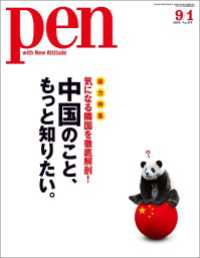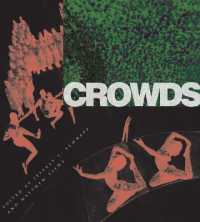Full Description
You Call That Music?!: Korean Popular Music Through the Generations provides a critical overview of the history of Korean popular music from 1920 to the 2000s from the perspective of cultural history. First published in Korean in 2017 by one of the best-known critics, Lee Young-Mee, this book is a timely and much-needed source of information on Korean popular music of the past hundred years.
Through this English translation, readers are able to make meaningful connections between specific forms of Korean popular music of various periods and the contemporaneous Korean social and political circumstances. Structured around the central theme of generational conflict, the book provides readers with an accessible way to engage with Korea's social history and a greater understanding of how specific musical works, genres and styles fit into that history. Its strong narrative force helps illuminate the connections between modern Korean social history and the particular trends of musical production and their reception through the decades.
You Call That Music?! is an invaluable resource for those researching and studying Korean popular music specifically as well as Korea's cultural and social history.
Contents
Foreword
Introduction
Author's Preface
Chapter 1: Generational Unity: Cause for Celebration?
Songs the Whole Family Can Enjoy
Generational Conflicts Promote Creativity!
The Ebbs and Flows of Generational Conflict
Chapter 2: Grownups in the 1930s: Shocked by the New Pop Music
What's Your Groupchat Profile Pic?
When Did Koreans Start Making Pop Music?
The New Trends Appall the Adults
How Old Was the Generation that Disliked Trot?
Super Junior on Gayo Stage?
Chapter 3: Was Trot Really for Teens?
Grownups Disliked Trot
Trot and Enka
It's Greek to Me: Grownups and the New Music
The Generation Educated in Japanese
Twenty-Somethings: Subversive Force in the Popular Arts
New and Refined Trot to Share with Young People in Tokyo
Chapter 4: Mambo Dancing in Mambo Pants: In the Aftermath of the Korean War
The Trot Generation Grows Old
Trot Eases Generational Conflicts
The Infiltration of "Vulgar" Music
Mambo Fever Brings Mambo Pants
"Après Girls" and "Madame Freedom"
Middle-Aged People Swept Up in Postwar Fashions
Chapter 5: American Standard Pop Patches Up Generational Differences: The Early 1960s
Is "Odong-dong Ballad" Really Less Vulgar Than "Yellow Shirt"?
The Scales Tip Toward Standard Pop
Could "Yellow Shirt" Be an International Hit?
Standard Pop: Modern, but not Decadent
Chapter 6: The Late 1960s: A Period of Easing Generational Conflict
The Age of Standard Pop
Youthful, but Still Familiar
Standard Pop: Wholesome and Modern
Chapter 7: Trot Lifts the Spirits—But Wait, Is It Japanese?!
Singing Japanese Songs on Independence Day?
The Remnants of Japanese Imperialism, Trot, and the 1965 Korea-Japan Treaty
Why Did the Middle-Aged Trot Generation Accept Standard Pop?
Does the Younger Generation Have "Superior" Taste?
Chapter 8: The Explosion of Generational Conflict: Youth Culture
A New Kind of Youth: Cheongchun vs. Cheongnyeon
The "Strong" Generation Becomes Middle-Aged
An Even "Stronger" Generation Comes of Age
Being a Student: A New Youth Identity
Chapter 9: Decadent Acoustic Guitars and "Backwards" Ppongjjak Collide
1971: A Pivotal Moment for Folk
"Wearing a Flower Ring" Corrupts Young Girls?
Unfounded Fears about Folk
"Backwards" Ppongjjak: Why Ppongjjak Was Considered "Backwards"
Anti-Folk: The Fear of Corrupting Students
Chapter 10: Cho Yong-pil Brings Generations Together
A Fusion of Trot and Rock?
Cho Yong-pil, a Superstar for All Ages
The Fusion of New Rock and Good Old Standard Pop
Raise That Familiar Melody an Octave and Shout It!
Chapter 11: The Seoul Olympics, Globalization, and "Underground" Music
Would "Morning Dew" Have Been as Popular in 1981?
"Underground" and Minjung Songs Go into Hiding
Korean Popular Music Catches Up to Sophisticated Western Pop
Skilled Artistry and a Sense of Stability
Chapter 12: The 1990s: The Era of Seo Taiji and Generational Conflict
Everyone's Talking About "the Generation" Again
The "Apgujeong Orange Youth" Emerges as the New Generation
What on Earth Is a Rock Café?
Hard to Dance Hip-Hop if You're Over 30
Chapter 13: Reversal, Resistance, and . . . ?
History Doesn't Always Repeat Itself Exactly
Satanism in a Seo Taiji Song?
The Youth Refuse to Conform
The New Generation: Resistance and Subversion
Still, History Continues . . .
Chapter 14: Epilogue: When Will an Age of Conflict Come Again?
The Importance of Knowing History
Toward Generational Harmony Again
When Will the Time of Generational Conflict Return?
Index








